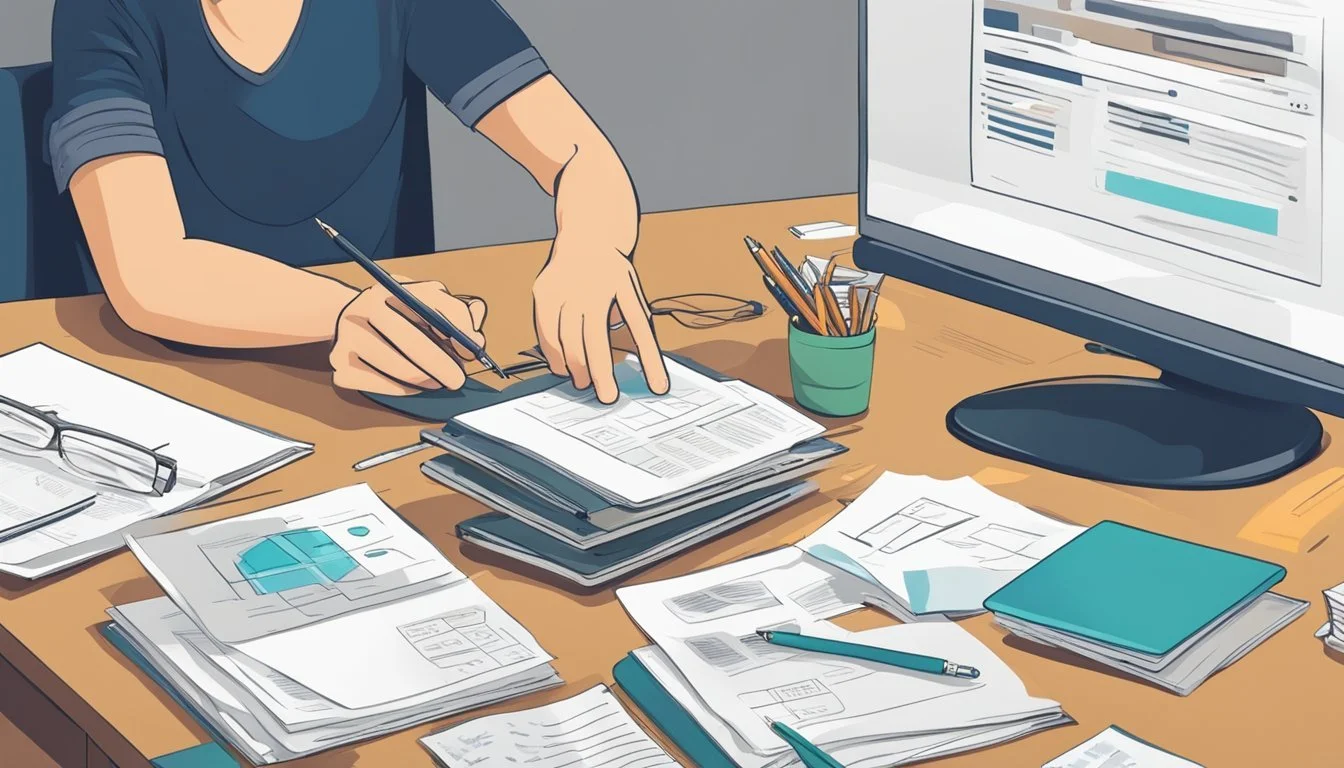12 Signs Your Coworker Is Trying to Take Credit
How to Spot and Prevent It
Navigating the workplace can be challenging, especially when it feels like a coworker might be trying to take credit for your ideas. This issue can impact team dynamics, affect your professional reputation, and even hinder your career growth.
Understanding the subtle signs that a coworker is trying to take credit for your work is essential in maintaining your professional integrity. Recognizing these behaviors early can help you take appropriate steps to address the situation, ensuring that your contributions are acknowledged and respected.
1) Takes Credit During Meetings
In team meetings, a coworker might present your ideas as their own. They may bring up concepts you shared privately and act as though they thought of them independently.
You might notice this behavior when your proposals suddenly come up in discussions, but no acknowledgment is given to you. They might be quick to speak up, leaving you with limited opportunities to clarify ownership of the idea.
Combating this requires documenting your ideas and sharing them with the team via email before meetings. This creates a paper trail and makes it clear who originated the concepts. If the issue persists, consider addressing it with your manager.
Another tactic is to actively participate during meetings and assertively share your thoughts before others can. By taking the initiative, you can reduce the chances of others misappropriating your contributions. For more strategies on this issue, check out Psych Central.
2) Forwards your emails with minor edits
A key sign that a coworker is trying to take credit for your ideas is when they forward your emails with slight modifications. Forwarding emails can be a necessary part of communication, but making small edits to your original messages raises red flags.
When someone changes the content of a forwarded email, it can misrepresent your ideas or contributions.
Making minor edits can give the appearance that the ideas originated from the sender, not you. This action can undermine your credibility and mislead others into attributing your work to someone else.
The ethics of email forwarding dictate that emails should be forwarded without any changes to ensure transparency and honesty. Any alterations can distort the original message and intent.
It's crucial to keep an eye on how your emails are being forwarded within your organization. If you notice changes, address the issue promptly to maintain the integrity of your communications. This behavior could be particularly harmful in collaborative environments where clear communication is vital.
3) Claims your ideas as their own in group chats
A coworker who is trying to take credit for your ideas may do so in group chats. They might present your suggestions as if they were their own insights. This can happen subtly, with them echoing your thoughts shortly after you share them.
They could also directly rephrase your idea and claim it during discussions. It's especially problematic because group chats have many witnesses. Your contributions can be overshadowed.
In such instances, it is beneficial to keep records of your original messages. This way, you can reference them if any dispute about the idea's origin arises. Keeping a clear, time-stamped record helps protect your integrity.
You might also see them praising your idea in private while publicly presenting it as their own. This could be particularly frustrating. Hence, documenting your contributions can safeguard your efforts and ensure you receive the credit you deserve.
4) Speaks over you when presenting
If a coworker consistently speaks over you during presentations, it’s a sign they may be trying to take credit for your ideas.
They might interrupt your explanations or jump in before you finish your thoughts. This behavior can undermine your confidence and make it seem like they are more authoritative.
This tactic aims to redirect attention to themselves, giving the impression that they are the primary contributor. Meeting settings can become frustrating, as you may feel your contributions are being overshadowed.
Maintaining professionalism while firmly addressing the interruptions can help establish boundaries and ensure that your voice is heard. Ensure you take control of the situation by politely reminding the coworker that you haven’t finished speaking.
Establishing clear roles and speaking times before meetings can also mitigate this issue. Make sure your points are well-articulated and documented, so ownership is clear.
Persistent interruption is not just rude but can also be a deliberate strategy to diminish your input. Recognizing this behavior is the first step toward addressing it effectively.
5) Seeks approval for projects using your concepts
A common sign that a coworker is trying to take credit for your ideas is when they seek approval for projects using your concepts.
They might present your ideas to management without acknowledging your contribution. This often involves subtly tweaking your plans to make them seem like their own original thoughts.
In meetings, they may casually mention your ideas as part of their proposals, aiming to gain approval from supervisors. They strategically time their presentations to ensure you aren't present or prepared to challenge their claims.
They might also draft emails requesting project approval, embedding your ideas within their requests. For example, they could follow a guide on requesting approval via email to format their proposal professionally.
When questioned, they may deflect by using phrases like, "we discussed this," implying joint ownership of the idea. This makes it harder for you to assert your sole contribution without seeming confrontational.
Keep an eye on coworkers who regularly use your concepts in their pitches to managers or across team communications, as this behavior might indicate their intention to take undue credit for your work.
6) Avoids involving you in follow-up discussions
A coworker trying to take credit for your ideas may avoid involving you in important follow-up discussions. By excluding you, they attempt to position themselves as the primary contributor. This behavior can prevent you from having a say in the project's progression.
When a coworker deliberately keeps you out of the loop, it becomes challenging to ensure your ideas are implemented as intended. Discussions without your participation can lead to misinterpretations.
Communication barriers like these may cause friction within a team. You might notice follow-up meetings happening without your knowledge. This exclusion can be a tactic to diminish your role and influence in the project.
Coworkers employing this tactic often provide minimal information about ongoing developments. Their goal is to present themselves as the sole expert, effectively sidelining your contributions. It is important to address this issue professionally.
Recognizing this sign early can help in taking appropriate action. Keep documentation of your contributions and communicate directly with supervisors if necessary. This approach can ensure that credit is fairly distributed and your input is acknowledged.
7) Boasts about achievements using your strategies
A common sign that a coworker is trying to take credit for your ideas is when they boast about achievements using your strategies. They may present your innovative solutions as their own in team meetings. This approach often makes them appear more competent and creative in the eyes of management.
Another sign is when they discuss successes that directly result from tactics you provided. They may gloss over details that would reveal your input, instead focusing on the positive outcomes. This behavior can create an inaccurate picture of their contributions.
They may also highlight milestones reached due to your methodologies. By emphasizing these accomplishments, they aim to solidify their position within the team. This tactic is especially prevalent in competitive environments.
Occasionally, they will share these successes in casual conversations. They might mention how their approaches led to these impressive results, neglecting to give credit where it's due. This can be particularly frustrating when it happens in one-on-one interactions with key stakeholders.
In performance reviews, they might subtly insert your strategies as examples of their own resourcefulness. This move can enhance their profile, potentially impacting your own evaluation. Awareness of this tactic is crucial to address it effectively.
For more insights into identifying such behaviors, the article Signs Your Coworker Is Threatened by You and How to Deal With It can provide additional context and methods to handle the situation.
8) Fails to Acknowledge Your Contributions in Reports
When a coworker consistently fails to acknowledge your contributions in reports, it can be a clear sign they are trying to take credit for your ideas. They might omit your name or downplay your role in the project's success.
This behavior can often occur in both internal and external communications. For instance, in meetings or email updates, your coworker may gloss over your efforts while highlighting their own inputs.
Actions like these not only affect your morale but can also impact your professional reputation. The lack of recognition can lead to missed opportunities for growth and advancement. Regularly documenting your work and involving your manager can help address this issue.
In some cases, the omission may be subtle. They might include vague statements that make it difficult for others to determine who was responsible for key parts of the project. This ambiguity can make it seem like all the credit belongs to them.
When addressing this behavior, ensure your concerns are based on documented instances. This proves you are not making unfounded accusations and highlights the need for proper recognition.
9) Exaggerates their role in collaborative tasks
A coworker who tries to take credit for others’ work often overstates their involvement in team projects. They might frequently mention their supposed contributions in meetings or emails.
This behavior can be subtle, such as highlighting their minor roles while downplaying or ignoring the significant input of others.
To manage this, maintain detailed records of your contributions. Documentation can help clarify the true nature of the team’s efforts if discrepancies arise.
Speaking to your manager privately and providing clear evidence of your work can also prevent misunderstandings. For more strategies, consider looking at the advice on how to handle a colleague who takes over tasks.
Being professional and unemotional in these discussions can also be crucial. This approach helps to maintain a calm and focused environment. If you're looking for more insights, you might find helpful tips on dealing with manipulative coworkers on UpJourney.
10) Reframes your suggestions as their brainchild
A coworker trying to take credit for your ideas might reframe your suggestions as their own innovation. When you present an idea during a meeting, they may subtly rephrase it and then announce it as if they had thought of it themselves.
This tactic often involves changing small details of your suggestion. This way, it seems like a new contribution, yet the core concept remains the same. They might even act surprised by their own "inspiration," adding to the illusion.
They could also wait until you're out of the room before presenting your ideas. By doing this, they can remove any immediate chance for you to correct them or call them out. When the idea is well-received, they continue to build on it confidently.
These individuals might even praise their own suggestion in front of higher-ups. Such affirmation pushes the perception that they originated the idea, further distancing the suggestion from you.
It’s important to document your contributions. Share your ideas via email or other written communication before meetings. This creates a timestamped record, making it harder for someone to claim your contributions as their own.
Watch for this behavior and address it when necessary. Confronting the individual privately at first can help avoid public confrontations and maintain a professional environment.
11) Uses your notes for their presentations
A coworker taking your notes for their own presentations is a clear sign they're trying to claim your ideas. When they do this, they gain credit in front of supervisors and colleagues.
Notice if your documents, slides, or ideas appear in their presentations without acknowledgment. It's important to protect your work and set boundaries.
To prevent this, document your ideas and share them with dates and clear ownership. Use emails and memos to back up your claims. Ensure you present key ideas yourself in meetings.
If a coworker continues this behavior, address it professionally. Speak to them directly or involve a manager if necessary. Always maintain a respectful tone to avoid escalating the situation. Keep records of your discussions for future reference.
12) Expresses Your Plans as Their Initiatives
When a coworker expresses your plans as their initiatives, it becomes clear they aim to appropriate your ideas.
This action often occurs during meetings or in communications with supervisors. They might present your project proposals as their own, failing to mention your involvement.
Such behavior can create confusion about the origin of ideas. It may lead to your contributions being overlooked in performance reviews.
This tactic involves subtle manipulation. They may agree with your ideas in initial conversations but later present them without giving you proper credit.
Monitoring meetings and document communications helps in identifying such behavior. Documentation of your ideas and plans can serve as evidence.
Addressing this issue requires a strategic approach. Speaking privately with the coworker about acknowledging your contributions can sometimes rectify the situation.
If the behavior persists, involving a manager or HR might be necessary. Clear communication about your role in the project is vital to maintain your professional integrity.
Maintaining professionalism and objectivity is crucial. Reacting emotionally can sometimes escalate the situation, making resolution more difficult.
Recognizing Manipulative Behavior
Identifying manipulative behavior from a coworker requires paying close attention to changes in workplace dynamics and understanding common tactics they may use to take credit for your ideas.
Understanding Workplace Dynamics
A critical aspect of spotting manipulative behavior is observing how your coworker interacts with others in the workplace.
Manipulators often exhibit controlling tendencies, attempting to dominate team discussions or steer projects in a direction that benefits them. They may regularly interrupt colleagues or dismiss their contributions subtly.
Additionally, manipulators may foster a network of allies within the workplace to bolster their standing. This can involve love bombing new team members or those higher up in the hierarchy with excessive praise and attention.
Monitoring these behaviors can help you understand the manipulator's influence and the best way to safeguard your own contributions.
Common Tactics Used by Colleagues
Manipulative coworkers typically employ specific tactics to undermine others and take undue credit.
One common tactic is spreading office gossip and rumors that distort the reality of others' work or ideas, creating a toxic environment that favors the manipulator's narrative.
Another tactic includes falsifying statements about who contributed to a project's success. For example, they might claim solo effort on work that was collaborative, or outright claim ideas presented by others as their own.
Lastly, workplace manipulators often use guilt or shame to coerce colleagues into downplaying their own contributions. This emotional manipulation creates confusion and self-doubt, making it easier for them to take credit.
Recognizing these tactics allows you to protect your intellectual contributions and maintain a collaborative and transparent work environment.
Strategies to Protect Your Ideas
To safeguard your intellectual contributions at work, it is essential to keep meticulous records and maintain clear communication with your management team. This ensures that your efforts are recognized and your ideas are attributed to you.
Documentation and Proof of Concept
Keeping thorough documentation of your ideas is crucial. Emails, meeting notes, and draft proposals serve as tangible evidence of your work. By storing these records, you can easily demonstrate that you are the originator of an idea.
Digital tools such as project management software allow for time-stamped entries and version histories. This can be helpful when needing to show the development timeline of your concept.
Creating a proof of concept can also be effective. A preliminary model or a detailed plan that outlines your idea highlights your role as the creator. Prototypes, flowcharts, or diagrams can visually reinforce your contribution. Backing up your work on multiple platforms, such as cloud storage and physical drives, ensures that you always have access to your records.
Effective Communication with Management
Discussing your ideas with your manager early in the process is important. This direct line of communication helps to establish your ownership from the outset. Provide your manager with regular updates and developments on your projects. This keeps them informed and positions you as the key driver behind these initiatives.
One-on-one meetings can be particularly effective. These private discussions provide an opportunity to share your progress and plans without interference from others. It's prudent to follow up these conversations with a brief summary email, reiterating your key points and reinforcing your ownership of the ideas discussed.
Avoid making complaints about coworkers in these meetings; instead, focus on positively presenting your work and contributions. This professional approach helps you maintain credibility and fosters a positive working relationship with your management team.











